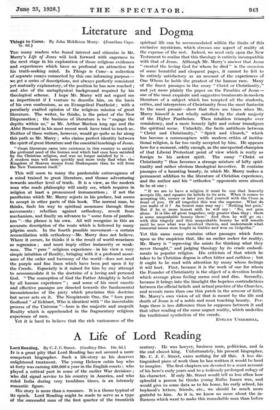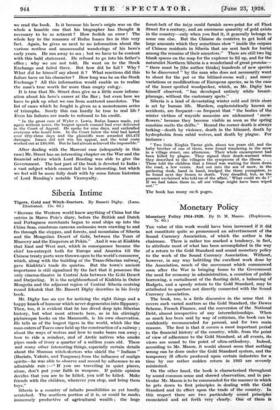A Life of Lord Reading
Lord Reading. By C. J. C. Street. (Geoffrey Bles. 10s. 6d.) IT is a great pity that Lord Reading has not secured a more competent biographer. Such a life-story as his deserves enlightened treatment. The young Hebrew cabin boy who at forty was earning 230,000 a year in the English courts ; who played ,a critical part in some of the earlier War decisions ; who did signal service to his country in America, and who ruled India during very troublous times, is an intensely romantic figure.
His story is more than a romance. It is a theme typical of its epoch. Lord Reading might be made to serve as a type of the successful man of the first quarter of the twentieth
century. He was lawyer, business man, politician, and in the end almost king Unfortunately, his present biographer, Mr. C. J. C. Street, cares nothing for all this. A less dis- tinguished piece of work than he has written it would be hard to imagine. The first chapters are devoted to a scant account of his hero's early years and to a tediously prolonged eulogy of his character. If only Mr. Street would tell us less often how splendid a person he thinks young Rufus Isaacs was, and would give us some data as to his home, his early school, his boyhood's letters, friends, etc., we should be much more grateful to him. As it is, we know no more about the in- fluences which went to make this remarkable man than bdOre we read the book. Is it because his hero's origin was on the whole a humble one that his biographer has thought it necessary to be so reticent ? How foolish an error ! The
whole key to the romance of Rufus Isaacs lies in this very fact. Again, he gives us next to no information about the various restless and unsuccessful wanderings of his hero's early years. He ran away to sea ; but we have to be content with this bald statement. He refused to go into his father's office ; why we are not told. He went on to the Stock Exchange and failed there. But how did he fail ? Why ? What did he himself say about it ? What reactions did this failure have on his character ? How long.was he on the Stock
Exchange ? All this information would enable us to realize the man's true worth far more than empty eulogy.
It is true that Mr. Street does give us a little more inform- ation about his hero's career at the Bar ; but even here we have to pick up what we can from scattered anecdotes. The list of cases which he fought is given as a monotonous series of triumphs. Surely this Can hardly be true to real life ? Even his failures are made to redound to his credit.
" In the great case of Wyler v. Lewis, Rufus Isaacs made, yet again without notes, the longest speech counsel had ever delivered in the Court of Appeal. He spoke for nine days:and enthralled everyone who heard him. In the Court below the trial had lasted over fifty-three days and the plaintiffs were awarded £65,472 damages. Isaacs did not win his appeal, and the total costs worked out at £40,000. But he had almost achieved the impossible."
After dealing with the Marconi case (adequately in this case) Mr. Street has an interesting chapter on the War and the financial advice which Lord Reading was able to give the Government. The last part of the book is devoted to India : a vast subject which cannot fail to be interesting, but which
we feel will be more fully dealt with by some future historian of Lord Reading's notable Viceroyalty.































 Previous page
Previous page